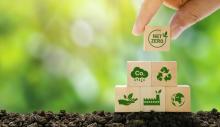Sustainable Solutions for Energy and Agriculture from Repurposed Organic Waste
Ductor addresses today’s environmental challenges in the energy and agriculture sectors by unlocking bioresources to make food production sustainable and energy generation clean. The company repurposes organic waste, transforming it into carbon-reduced fertilizers and renewable energy. Specializing in high-nitrogen organic waste that cannot be processed in conventional biogas systems, Ductor uses waste from agriculture, aquaculture, and other organic sources. This waste is fed into the Ductor reactor, where a patented microorganism consortium ferments it.
